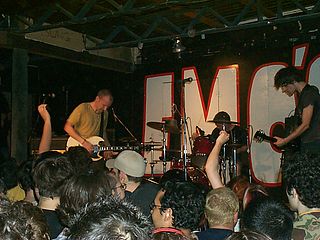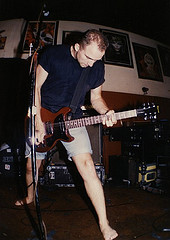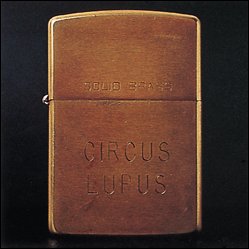
Fugazi is an American post-hardcore band that formed in Washington, D.C., in 1986. The band consists of guitarists and vocalists Ian MacKaye and Guy Picciotto, bassist Joe Lally, and drummer Brendan Canty. They are noted for their style-transcending music, DIY ethical stance, manner of business practice, and contempt for the music industry.

Embrace is the debut record and the only release by the American post-hardcore band Embrace.

Scream is an American hardcore punk band from Washington, D.C.; they originally formed in the suburb of Bailey's Crossroads, Virginia. Scream originally formed in 1981 within the vanguard of the Washington Hardcore explosion. In 2009, the band reunited, and as of January 2012 were on tour in Europe. As of 2017, the band was still touring in both America and the United Kingdom.
Post-hardcore is a punk rock music genre that maintains the aggression and intensity of hardcore punk but emphasizes a greater degree of creative expression. It was initially inspired by post-punk and noise rock. Like post-punk, the term has been applied to a broad constellation of groups. Post-hardcore began in the 1980s with bands like Hüsker Dü and Minutemen. The genre expanded in the 1980s and 1990s with releases by bands from cities that had established hardcore scenes, such as Fugazi from Washington, D.C. as well as groups such as Big Black and Jawbox that stuck closer to post-hardcore's noise rock roots. In the early- and mid-2000s, post-hardcore achieved mainstream success with the popularity of bands like My Chemical Romance, Dance Gavin Dance, AFI, Underoath, Hawthorne Heights, Silverstein, The Used, At the Drive-In, Saosin, Alexisonfire, and Senses Fail. In the 2010s, bands like Sleeping with Sirens and Pierce the Veil achieved mainstream success. Meanwhile, bands like Title Fight and La Dispute experienced underground popularity.
State of Alert was an American hardcore punk group formed in Washington, D.C. in October 1980, and active till July 1981. S.O.A. was fronted by Henry Rollins, then using his original surname Garfield.

Jawbox is an American post-hardcore band from Washington, D.C., formed in 1989 by J. Robbins (vocals/guitar), Kim Coletta (bass), and Adam Wade (drums). After the trio released the album Grippe in 1991, Bill Barbot (guitar/vocals) joined as the fourth member. Jawbox released their second album Novelty in 1992, followed by Wade being replaced by Zach Barocas that same year. Jawbox signed to the major label Atlantic Records and released their third album For Your Own Special Sweetheart in 1994, which spawned the band's most recognizable song "Savory". After the release of their fourth album Jawbox in 1996, the band departed from Atlantic, and subsequently disbanded in 1997. They reunited for a brief one-off show in 2009, followed by a full-time reunion in 2019. Barbot left the band in 2021 and he was replaced by Brooks Harlan.

Mary Bozana Timony is an American independent singer-songwriter, guitarist, keyboardist, and violist. She has been a member of the bands Helium, Autoclave and Wild Flag, and currently fronts Ex Hex.
Q and Not U was a post-hardcore band from Washington, D.C., signed to Dischord Records. Members John Davis, Harris Klahr, Christopher Richards, and Matt Borlik formed the band in 1998. After Borlik's departure following the release of their first album, the band went on to record two more critically acclaimed LPs as a three-piece, exploring aspects of dance-punk and other disparate musical styles. Q and Not U disbanded in September 2005 after completing their touring commitments and a short farewell stand at Washington, D.C. venue the Black Cat.
Soulside, also spelled Soul Side, was an American post-hardcore band from the greater Washington, D.C. area. The original name of the band was Lunchmeat which was formed by high school students Bobby Sullivan, Chris Thomson, Scott McCloud and Alexis Fleisig in 1985. Lunchmeat played their last show under that name on August 29 of the same year as the group went on hiatus while the members went to college.
Circus Lupus was a post-hardcore band based in the area of Washington, D.C. The band originally formed in Madison, Wisconsin, where one-time Ignition and Soul Side bassist Chris Thomson met guitarist Chris Hamley and drummer Arika Casebolt while attending school. The name "Circus Lupus" comes from an SCTV sketch about "Circus Lupus, the Circus of Wolves", a mock TV commercial for an entirely wolf-filled traveling circus, with graphics of wolves on trapeze swings and other circus apparatus. Reg Shrader initially played bass with the band. He was replaced by Seth Lorinczi, as the band was making its transition from Madison to Washington.

Solid Brass is the second and final studio album by the band Circus Lupus. It was released by Dischord Records in 1993; its catalog number is DIS79.

Teen Beat is an American independent record label, originally based in Arlington, Virginia, now based in Cambridge, Massachusetts. It was founded by Mark Robinson in 1984 at Wakefield High School, along with Phil Krauth, Andrew Beaujon, Tim Moran, and Ian Zack.

Ian F Svenonius is an American musician and singer of various Washington, D.C.-based punk bands including Nation of Ulysses, the Make-Up, Weird War, XYZ, Escape-ism, and Chain and the Gang. Between his numerous projects, Svenonius has released more than 22 full-length albums and over 20 singles, EPs, and splits. A published author and online talk show host, Svenonius' projects share a tongue-in-cheek, radical left political ideology.
Jerry Busher is an American drummer and multi-instrumentalist. He is known for his work with Fidelity Jones and Fugazi.

Void was an American hardcore punk band formed in Columbia, Maryland, in 1980. The group was a pioneering force in the thriving D.C. Hardcore scene in Washington D.C. during the early 1980s, successfully combining elements of punk with heavy metal in a style that was accepted by the scene's otherwise exclusive community. Void's punk metal fusion sound was marked by guitarist Bubba Dupree's innovative guitar work and the "unhinged" vocals of John Weiffenbach, which resonated in the band's chaotic but popular live performances. Like many of their contemporaries, Void had a short-lived recording career, limited to the split album Faith/Void Split with the Faith on Dischord Records. However, they have enjoyed an enduring cult following among hardcore aficionados.

Blue Giant is an American rock band from Portland, Oregon. An eclectic mix of country, indie rock, and psychedelic styles, Blue Giant have been called a Portland supergroup. The band was originally composed of the songwriters and musicians from Viva Voce, Kevin Leigh Robinson and Anita Lee Elliott, Chris Funk of The Decemberists, Evan Railton of Swords, and Seth Lorinczi of The Golden Bears, Circus Lupus & The Quails. Musically, Blue Giant could be characterized as rural psychedelic rock, with one music critic calling them a perfect country rock band.
Swiz was an American hardcore punk band formed in 1987 in Washington, D.C., United States.
Don Zientara is an American record producer and musician. He owns and runs Inner Ear Studios in Arlington, Virginia, located just outside Washington D.C., and is most widely known for his production work with Fugazi, Minor Threat and various other Dischord Records artists.
Holy Rollers was an American punk band that formed in 1988 in Washington, D.C. The band initially was composed of guitarist/vocalist Marc Lambiotte, bassist/vocalist Joe Aronstamn, and drummer/vocalist Max Micozzi. Band members alternated lead vocals and Holy Rollers were the first D.C. punk band to incorporate three-part harmonies. Music historians and authors Mark Andersen and Mark Jenkins described the band's sound as "kinetic punk-funk" with "passionate, message-driven songs." Holy Rollers were a part of new trend in post-hardcore artistic diversity that developed within the D.C. punk scene of the late 1980s and early 1990s. They released three albums on Dischord Records, an American punk label that Noisey described as "one of the most respected and revered [record labels], punk or otherwise, in the world." As AllMusic declared, "[w]ithout being an arena act or coming off with the aggrandizing air of one, the Holy Rollers still make big music that can inspire and go beyond simple post-hardcore approaches."










